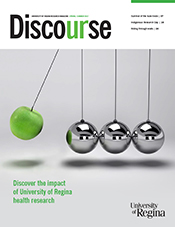Categorizing intimate partner violence perpetrators can increase victim safety and prevent violent re-offense.

For more than a decade, Crystal Giesbrecht has worked in the intimate partner violence sector. During this time she’s seen that applying a one-size-fits-all approach to the perpetrators committing the violence doesn’t work.
“In order to keep women safer, we need to do something different,” says Giesbrecht, who began her career working in the area of intimate partner violence at a domestic violence shelter in 2009.
Now, thanks to a prestigious Vanier Canada Graduate Scholarship valued at $150,000 over three years, Giesbrecht’s goal is to create a better way moving forward.

“During my research program, I’ll work to create a straightforward way to categorize perpetrators of intimate partner violence. My hope is that this typology could help triage them into intervention programs,” explains Giesbrecht, who is a PhD candidate in justice studies at the University of Regina and the director of research and communications with the Provincial Association of Transition Houses and Services of Saskatchewan (PATHS) - a member association for agencies that provide intimate partner violence services across the province.
Giesbrecht says that her plan is to create a typology of perpetrator characteristics using data available in provincial probation and correctional records.
“I’ll be looking to see if perpetrators have committed violence only against intimate partners, or if they also have victims outside the family. I’ll try to determine if they are generally violent, and/or if they’re involved in other criminal activity,” says Giesbrecht.
She says other behaviours she’ll look for include whether individuals are more coercive and controlling, confining their violence to the home – to their partner and maybe their children. She’ll see if they are impulsive and reactive or if their violence is methodically planned out. She’ll see if their violence is psychological, physical, and/or sexual in nature.
“Looking at the motivations behind violence is necessary to come up with proactive solutions for safety,” says Giesbrecht. “Classifying intimate partner violence perpetrators will have implications for how we assess the risk for future violence, how treatment interventions are developed and delivered, and how to potentially mitigate future violence – as well as for general risk management to keep their partners or future partners safe.”
Giesbrecht says creating perpetrator typologies using data that’s already been collected is a practical way to make a difference.
“There’s a lot of evidence about the usefulness of using typologies, but we’re not yet to a place where we use them in a practical way. The goal of my work will be to provide professionals on the ground with perpetrator characteristics and the types of violence they commit – along with other important variables – to come up with a classification system that can help keep everyone safer.”
Giesbrecht is nationally recognized as an expert in her field and has served as a member of the Expert Advisory Panel for the Canadian Femicide Observatory for Justice and Accountability since 2017. She is also a member of the Multi-Sector Review Committee for Clare’s Law, which provides guidance to police regarding disclosure of risk information related to someone’s violent history to new intimate partners whose safety may be threatened.
The Vanier Canada Graduate Scholarships program was launched in 2008 by the Government of Canada, to strengthen the country’s ability to attract and retain world-class doctoral students and establish Canada as a global centre of excellence in research and higher learning.

















